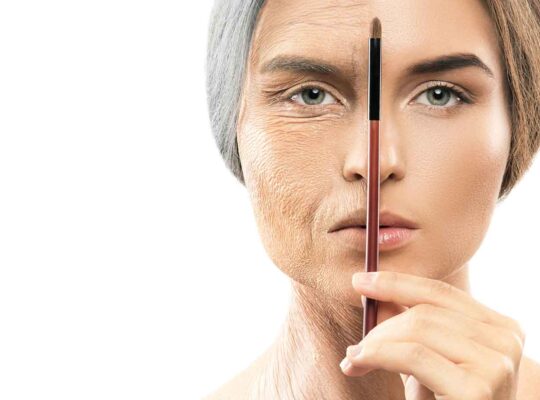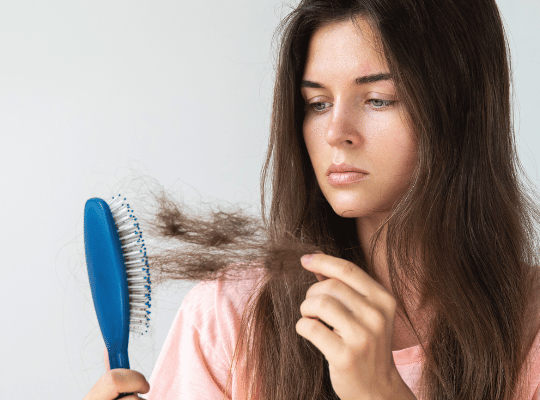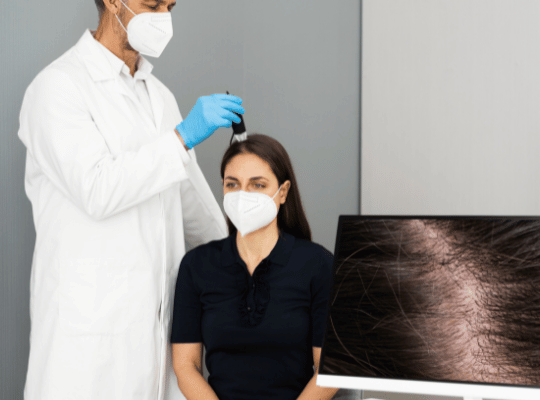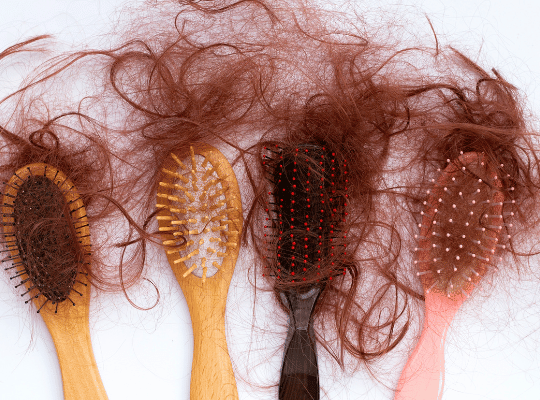Have you started taking Wellbutrin and noticed more hair falling out than usual? You might be wondering if the medication is causing your hair loss. Wellbutrin, also known as bupropion, is a medicine often used to treat depression and help people stop smoking. While it’s helpful for many people, it can sometimes cause side effects, including hair loss. In this article, we’ll look at why Wellbutrin might cause hair loss, how to tell if it’s happening to you, and what you can do about it.
What is Wellbutrin?
Wellbutrin is a prescription drug that doctors often use to treat depression and seasonal affective disorder (SAD), a type of depression that happens at certain times of the year. It’s also used to help people quit smoking. Wellbutrin works differently from other antidepressants because it affects two chemicals in your brain called norepinephrine and dopamine, which help control your mood and energy levels.
Common Uses and Benefits
Doctors like to prescribe Wellbutrin because it can lift your mood without causing some of the side effects that other antidepressants might, like weight gain or problems with sexual health. It can also give you more energy, which is helpful if your depression makes you feel tired all the time.
How It Works in the Body
Wellbutrin helps by keeping norepinephrine and dopamine in your brain longer, which boosts your mood and energy. But these changes can also cause side effects, including, for some people, hair loss.
The Connection Between Wellbutrin and Hair Loss
Prevalence of Hair Loss as a Side Effect
Hair loss isn’t a common side effect of Wellbutrin, but some people have reported it. Although it’s not listed as a major side effect, any medicine that changes how your body works can potentially lead to hair loss.
Possible Mechanisms Behind Wellbutrin-Induced Hair Loss
Experts aren’t exactly sure how Wellbutrin might cause hair loss, but they have some ideas. One possible cause is something called telogen effluvium. This happens when stress or a big change in your body causes more hair than usual to stop growing and fall out a few months later. This type of hair loss usually spreads evenly across your scalp, so you might notice that your hair looks thinner all over.
Telogen Effluvium and Medication-Induced Hair Loss
Telogen effluvium is a common type of hair loss that can happen after your body goes through a shock, like starting a new medication. When your body is stressed, it can push a lot of your hair follicles into the resting phase, which means they’ll stop growing hair. After a few months, this hair falls out, making your hair look thinner. The good news is that this kind of hair loss is usually temporary, and your hair can grow back once the stress or change is over.
Recognizing Hair Loss Symptoms
Common Signs of Hair Loss
If you’re losing more hair than usual, you might notice more hair in your brush, on your pillow, or in the shower drain. Your hair might also start to feel thinner, especially if you notice your part getting wider or your ponytail getting smaller.
Differentiating Between Normal Shedding and Medication-Induced Hair Loss
Everyone loses some hair every day—most people shed about 50 to 100 hairs daily. But if you notice a lot more hair falling out than usual, it could be a sign of telogen effluvium or another type of hair loss caused by medication. Keeping track of how much hair you’re losing and paying attention to any other changes in your health can help you and your doctor figure out if Wellbutrin is the cause.
When to Consult a Healthcare Provider
If you’re worried about hair loss while taking Wellbutrin, it’s a good idea to talk to your doctor. They can help figure out if the medication is causing the hair loss and discuss what to do next. Don’t stop taking Wellbutrin on your own without talking to your doctor first, because stopping suddenly can cause other problems, like withdrawal symptoms.
Managing Hair Loss While on Wellbutrin
Discussing Concerns with Your Doctor
If you think Wellbutrin is making your hair fall out, talk to your doctor about it. They might suggest continuing the medication, changing the dose, or trying a different treatment. Your doctor can also recommend ways to help manage the hair loss.
Potential Treatment Options
If your doctor agrees that Wellbutrin is causing your hair loss, here are some treatments you might consider:
Topical Treatments
- Minoxidil (Rogaine): This is a popular over-the-counter treatment that you can apply directly to your scalp. It can help your hair grow back, especially in areas where it has started thinning.
Oral Medications
- Low-Dose Oral Minoxidil: Minoxidil can also be taken as a low-dose pill, but only under a doctor’s supervision. This might be an option if using the topical version doesn’t work well for you.
Alternative Therapies
- Platelet-Rich Plasma (PRP) Therapy: PRP therapy involves taking some of your blood, concentrating the platelets, and injecting them into your scalp to help stimulate hair growth. It can work well but can be expensive.
- Natural Compounds and Herbal Remedies: Some people prefer to use natural options like biotin supplements, saw palmetto, or rosemary oil. These are generally safe but might not be as effective as medical treatments.
Weighing the Benefits and Risks
Importance of Mental Health Treatment
While losing your hair can be upsetting, it’s important to remember that taking care of your mental health is crucial. Depression is a serious condition that needs treatment, and Wellbutrin can be very effective. In many cases, the benefits of taking Wellbutrin might be more important than the side effect of hair loss, especially if the hair loss is mild or manageable.
Balancing the Effectiveness of Wellbutrin Against Potential Side Effects
If hair loss becomes a bigger concern, you’ll need to weigh the pros and cons of continuing Wellbutrin. Talking to your doctor can help you make the best decision. They might suggest trying a different antidepressant with a lower risk of hair loss or finding ways to reduce the hair loss while staying on Wellbutrin.
Alternative Antidepressants with Lower Risk of Hair Loss
If Wellbutrin isn’t working out because of side effects like hair loss, your doctor might recommend another antidepressant. Some medications, like certain SSRIs (such as escitalopram) or SNRIs (such as venlafaxine), might be less likely to cause hair loss. Every medication has its own side effects, so finding the right one is a process that you and your doctor can work on together.
Coping Strategies for Hair Loss
Psychological Impact of Hair Loss
Losing your hair can be really hard, especially if it makes you feel less confident or anxious. It’s important to acknowledge these feelings and find ways to cope with them.
Support Groups and Resources
Talking to other people who are dealing with hair loss can be really helpful. Support groups, whether they meet in person or online, offer a place to share your experiences and get advice. There are also organizations like the American Hair Loss Association that provide helpful information and resources.
Cosmetic Solutions
If you want to cover up the hair loss, there are several options:
- Wigs and Hairpieces: High-quality wigs and hairpieces can look natural and help you feel more comfortable.
- Scalp Concealers: Products like hair fibers or scalp concealers can make thinning hair less noticeable.
- Hairstyling Techniques: Certain hairstyles can help hide thinning spots and make your hair look fuller.
When to Consider Discontinuing Wellbutrin
Situations Where the Side Effects Outweigh the Benefits
Sometimes, the side effects of Wellbutrin, like hair loss, might be worse than the benefits you’re getting from the medication. If your hair loss is severe and affecting your life, it might be time to think about stopping Wellbutrin.
Importance of Consulting with a Healthcare Provider Before Stopping Medication
However, don’t stop taking Wellbutrin without talking to your doctor first. Stopping suddenly can cause withdrawal symptoms and might make your depression come back. Your doctor can help you stop the medication safely if that’s the best choice.
Tapering Off Safely to Avoid Withdrawal Symptoms
If you and your doctor decide that stopping Wellbutrin is the right thing to do, it’s important to taper off the medication slowly. This means gradually lowering your dose over time to avoid withdrawal symptoms like anxiety or mood swings. Your doctor will guide you through this process to make sure it’s done safely.
Conclusion
Hair loss can be a troubling side effect of Wellbutrin, but understanding why it happens and what you can do about it can help you manage the situation. Whether you choose to treat the hair loss with options like minoxidil or PRP therapy, or explore other antidepressants, it’s important to work closely with your healthcare provider. They can help you find the best solution for both your mental health and your hair.
Comparison of Hair Loss Treatment Options for Wellbutrin Users
| Treatment | Effectiveness | Side Effects | Cost | Prescription Required |
|---|---|---|---|---|
| Topical Minoxidil | Moderate | Minimal (e.g., scalp irritation) | Low-Moderate | No |
| Oral Minoxidil | Moderate-High | Potential heart-related effects | Low | Yes |
| PRP Therapy | Moderate | Minimal (e.g., soreness at injection site) | High | No (medical procedure) |
| Natural Remedies | Variable | Generally minimal | Low-Moderate | No |
FAQs About Hair Loss with Wellbutrin
- Can Wellbutrin cause hair loss?
- Yes, some people have reported hair loss while taking Wellbutrin, though it’s not a very common side effect.
- Is hair loss from Wellbutrin permanent?
- Most of the time, hair loss from Wellbutrin is temporary and your hair may grow back after your body adjusts to the medication or if the medication is stopped.
- What should I do if I notice hair loss on Wellbutrin?
- Talk to your doctor. They might suggest continuing the medication, adjusting the dose, or using treatments like minoxidil to help with hair regrowth.
- Are there antidepressants that don’t cause hair loss?
- Yes, other antidepressants, like SSRIs or SNRIs, might have a lower risk of causing hair loss. Your doctor can help you find the best option for you.
- Should I stop taking Wellbutrin if I notice hair loss?
- Don’t stop taking Wellbutrin without talking to your doctor. They can help you decide the best course of action and make sure you taper off safely if needed.
















